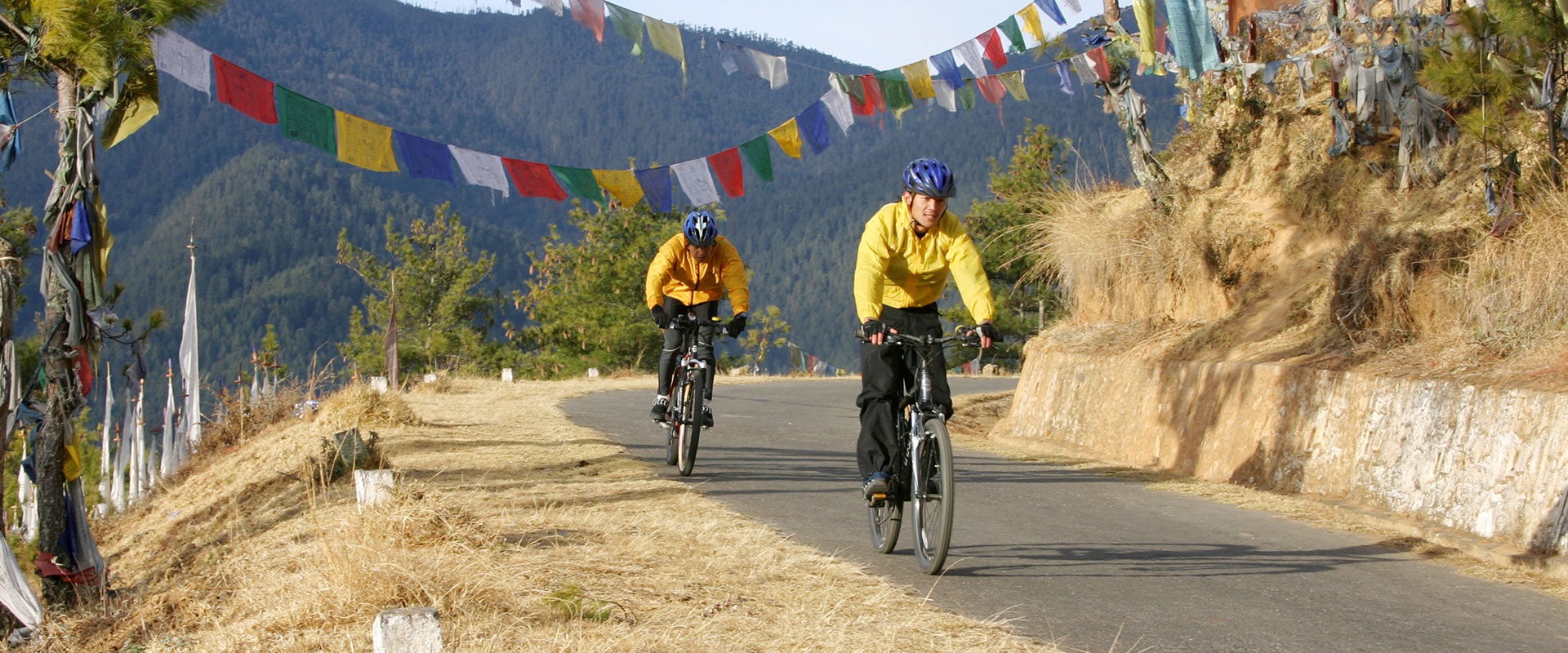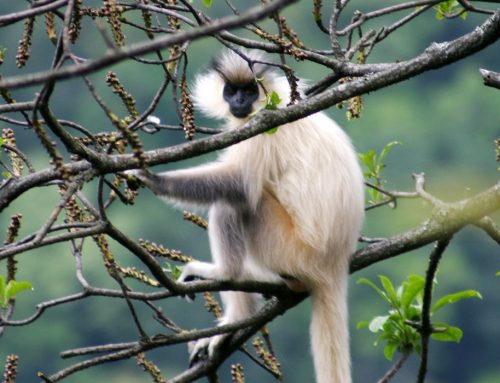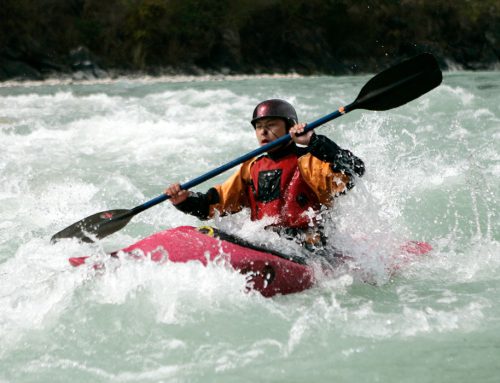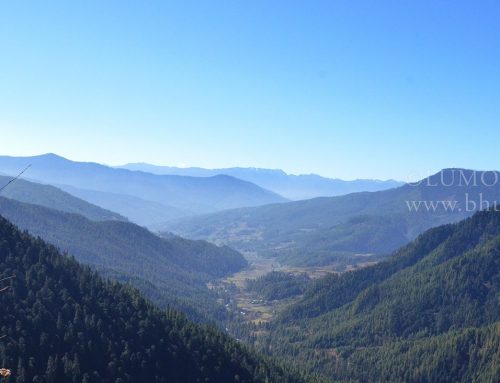Mountain biking is the best way to discover Bhutan, a very scenic mountainous terrain. Bhutanese locals and visitors are taking to this new sports tourism as it is Low Carbon and it gives an authentic experience by cycling through off roads inhaling fresh air all the way. As much as riders are expected to be adequately fit, our tour guides and van drivers are perfectly equipped with survival and safety skills required to tread these routes.
- Demography: Explorer/ Challenger
- Duration: 10 days
- Best to visit: March to November
Our trips provide a sense of being transported back in history. Bhutan’s mountainous terrain offers a fascinating adventure for biking enthusiasts.
Day 01: Bangkok/Delhi/Kathmandu – Paro
Highlights: Spectacular views of Mt Everest (8,848 m), Kanchenjunga (8,586m) and Lhotse (8,414 m); and a literal adrenaline-pumping landing on the roof of the world.
Travel by Druk Air, Bhutan’s national airline, to Paro, the country’s only international airport. The flight is exhilarating to say the least, as the route traverses parallel to the mighty Himalayas enabling passengers to see the world’s highest peak, Mt Everest, and many more. The descent affords a panoramic view of Bhutan’s foothills culminating into a thrilling landing at what is considered one of the world’s most challenging airports.
Meet your guide at the airport and head to the hotel for lunch. Devote the afternoon to sightseeing around the Paro valley famed for its natural beauty, historical monuments, agricultural farms and quintessentially Bhutanese village communities. Visit the National Museum, formerly a watch tower, and then the Castle on a Heap of Precious Jewels or RinpungDzong. Wind up the day with a stroll around Paro town. Overnight at the hotel.
Day 02: Discovering Paro Valley
Highlights: Hike to the Tiger’s Lair, the most famous Buddhist monastery in the Himalayas, built on a sheer rockface.
After breakfast, drive for half an hour and start hiking up to the temple that is renowned in the Himalayan Buddhist world as one of the most popular sites of pilgrimage. The five-hour round trip follows an ancient but oft-trodden footpath flanked by water-driven prayer wheels.
The temple, precariously perched on a hair-raising ravine about 1,000 metres above the valley floor, is considered sacrosanct as it was in a cave within this temple that the eight century tantric saint, Padmasambhava, subdued the evils who obstructed the teachings of the Buddha. The saint is believed to have come to Taktshang in a fiery wrathful form riding a tigress. Over the years, many Buddhist saints have meditated in and around the temple and discovered numerous hidden treasure teachings.
Visit the ruins of DrugyelDzongenroute. The fortress known as the “Castle of the Victorious Drukpa”, is a symbol of Bhutan’s victory over the Tibetan invasions in the 17th and 18th centuries. We can also get a view of the sacred mountain, Jumolhari, along the way. On the way back to our hotel, we will visit the 7th century Kyichu Temple believed to have been built on a place that resembled a knee of a giant ogress.
Evening Bike check, briefing & familiarization ride an orientation briefing before a short acclimatization ride in the valley. Overnight at hotel
Day 03: Paro – Haa Valley
Today you will ride to the Chelila Pass. This is a 30km uphill (the support vehicle will be on hand for guests who prefer not to ride the entire climb). This is an excellent road with very little traffic. The route travels through pristine alpine forests with magnificent mountain views. Reaching the pass, you will enjoy spectacular views of Jhomolhari. A 25km descent to the Haa Valley follows. Only recently opened to foreign tourists, the Haa Valley is a unique area of Bhutan. In the afternoon, you will tour sites by either vehicle or bike
Day 04: Haa Valley
In the morning, you will enjoy a short walk with visits to TachuGompa and LhakhangNagpo/Karpo. The twin temples were built in conjunction with the Kichu Temple in Paro to pin down an Ogress who was obstructing the spread of Buddhism. The builder of the temples, the Tibetan king TsongstenGampo, is said to have received his divinity to build the structures at the present-day location. A white and a black pigeon, alighting on this site, gave the temples these names. Today the temples are dedicated to the Guardian deity of Haa Valley. In the afternoon, you will tour sites by either vehicle or bike.
Day 05: Haa-Thimphu
Today you will enjoy a relaxing morning before continuing to Thimphu. Arriving in the early afternoon, you will have a colorful tour of the city. Your tour includes visits to the national library, memorial stupa, Bhutan’s Arts & Crafts School and and Bhutan’s largest monastic school, SimtokhaDzong. Built in the 1600’s, it is the oldest surviving Dzong in the country. Today it is a training center for those learning to teach Dzongkha, the national language. Other possible stops may include the Textile & Folk Heritage Museum and the textile weavers at Changzamtok, where you can observe local weavers at work.
Day 06: Thimphu
After breakfast, you will take a morning ride to Sangaygang. The ride begins at the Langchuphakha Bridge and passes ThimphuTashichoDzong built in 1641. After crossing the Zilukha Nunnery, you will have a panoramic view of ThimphuTashicho Dzong. You will continue your ride gradually ascending past the Zoo & Golden Takin Breeding Center. The Takin is the national animal of Bhutan. Before reaching Sangaygang, you will pass through a beautiful pine forest. A scenic view of the Thimphu Valley unfolds before you. After relaxing at the Sangaygang View Point, you will ride back to town.
In the afternoon, you will cycle towards Tango Cheri monastery which is 20km outside of Thimphu. Along the way, you will pass by the Queen Mother’s Palace and several small local villages. Continuing through the valley, the road travels through a pine forests along Wangchu River to Tango-Cherry Monastery. Tango- Cherry Monastery was built by Saint ZhabdrungNgawangNamgyal in 1620. If time permits, you can leave your bikes and take a hike to the monastery. Ride back to Thimphu.
Day 07: Thimphu- Punakha
Leaving;Thimphu, you will take a scenic drive across the Dochu La (3,200m) to Punakha and Wangdiphodrang. Crossing the pass there are great views of Bhutan’s Central Himalayan ranges. You may bike a portion of the trip to the pass. Driving through swarms of prayer flags fluttering in the wind, you cross the pass and descend into the sub-tropical Punakha River Valley. For this portion of the trip, you will bike all the way down to Punakha. This is a great ride! Punakha’s importance lies largely in the past when it was DrukYul’s capitol. The dzong’s sheer size and its elaborate art within give hint to Punakha’s former days of glory. Reaching Punakha, you will ride above the valley floor to the MeriPuensum Hotel. The hotel has dramatic views of the surrounding terraced fields and the snow covered Himalayas to the north.
Day 08: Punakha
Today is a full day of sighteeing by bike in the Punakha Valley. You begin the day riding to Punakha’s impressive dzong and then continue along the river with hiking opportunities to neighboring villages and temples.
Day 09: Punakha-Paro
In the morning you will take a short hike through terraced fields of rice to ChimiLhakhang. The trail leads through the fields to the settlement of Pana. You will continue your walk to the temple. This beautiful temple is known for increasing fertility in women. In recent years, Bhutanese women have been joined by women from other countries who journey to this temple in hopes of pregnancy. Aside from its significance to women, the temple is located in a wide-open valley making it a beautiful short walk. After the visit, you will ride along the river to Wangdiphrodrang and drive back to the Dochu La. From here you can bicycle all the way to Thimphu (18-mile downhill). In the evening continue to Paro by support vehicle. Evening stroll around Paro town. A festive farewell dinner this evening is planned.
Day 10: Depart Bhutan
Early morning departure to Bangkok, Delhi, Kathmandu or Kolkata from Paro.
- All Meals [Breakfast /Lunch/Dinner]
- Accommodation [Twin Sharing] Single Room Supplement Extra US $: 40 per room per night.
- All transportation within the country including airport transfers.
- Royalty & Govt. Taxes
- Entrance fees for Museums and Monuments only
- Visa Fee.
- Airport tax
- Tourism Development fund
- Sightseeing
- Druk Air fare.
- Insurance Premiums,
- Payments for service provided on a personal basis
- Cost for any services not mentioned in the “Cost Include head”.





